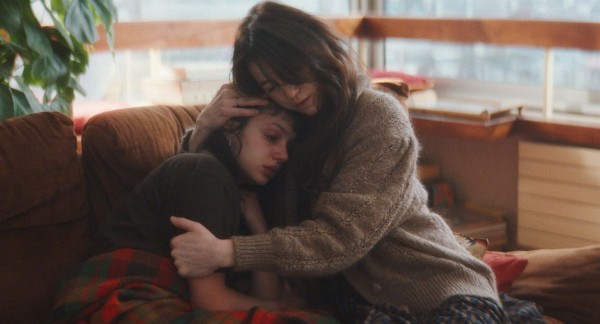MIKHAËL HERS: THE PASSENGERS OF THE NIGHT (2022) - MILL VALLEY FILM FESTIVAL NOÉE ABITA AND CHARLOTTE GAINSBOURG IN THE PASSENGERS OF THE NIGHT Weeping and wisps of the night
NOÉE ABITA AND CHARLOTTE GAINSBOURG IN THE PASSENGERS OF THE NIGHT Weeping and wisps of the nightHers follows Elizabeth (Charlotte Gainsbourg), and her two children, Matthias (Quito Rayon Richter) and Judith (Megan Northam), and a winsome waif called Tallulah (Noée Abita), who Elizabeth picks up at the eponymous nighttime talk show where she works, and who flits in and out of their lives. The time-scheme is a chunk of the 1980's. It starts in 1981 and later picks them up around 1988. Sweet, charming, and touching, this film is impeccably acted. Peter Bradshaw calls
Passengers of the Night "a likably unassuming and easygoing movie," and to enjoy it one must not demand too much of it. But it must inevitably play better for the local audience, especially those Parisians for whom the specifically evoked time and place are nostalgic. Otherwise, one is likely to think that not enough happens, and that there is something self-indulgent and repetitious here.
Two problems won't go away for me. One is Charlotte Gainsbourg, with her slightly rough beauty and her voice of breathy sweetness, a big star, really an icon in France, with her joint descent from the legendary singer-songwriter Serge Gainsbourg and the actress-model superstar Jane Birkin. It's impossible to forget for two minutes who she is. If you are a big fan that will presumably be fine. Otherwise, though, it's destructive. The other thing is the jump in time, and using the same young actors for both moments seven years apart. Excellent newcomer Richter may look fine as 22, but then when you think back, he didn't look 15 in the early segments. Nor does either of the other two young people look young enough in the beginning, or enough older in the later ones. Hers is counting on our indulgence on this.
There's a kind of sweet melancholy this film likes to indulge in, and it does it quite well, if you like that kind of thing. French reviewers have been appreciative of the emphasis on "night." Elizabeth is left with the kids in a roomy apartment (with big windows affording a panoramic view of Paris). She's an insomniac. Now she has to get a job. She quickly bombs out of her first due to a lack of a new necessity - computer skills. The late-night call-in talk show helmed by the formidable dame Vanda Dorval (Emmanuelle Béart) turns out to be perfect. Early on, Tallulah turns up, in person, a beautiful homeless girl-child who is helpless, pathetic, irresistible. You may not think her so; the film does.
Noée Abita is a cool actress, but the character of Tallulah in the screenplay by Maud Ameline, Mariette Désert, and Hers is somewhat vaguely conceived. She is sometimes an addict? How does that work? Abita seems more convincing in the later segment when Tallulah has gotten her shit together and can go out on her own. It turns out she's the actress who played the lead in
Slalom, where she's a teenage ski star with Jérémie Renier as her abusive coach, so there's a natural toughness about her. She's here more for somebody for Elizabeth to show her kindheartedness with and for Matthias to fall in love with in spite of himself. Matthias is a "poet," who isn't very motivated in school. The actor has something distinctive about him.
As happens in small French films the secondary characters are good because good actors come to play them, and Béart is one of the great ones, so her Vanda is very strong, though she only appears now and then. The film is more about weeping and romance. Hence it's important that through her secondary job in a library Elizabeth gets picked up by a gentleman who is taking out a lot of books as a prelude to taking her out. Hugo is played by a very solid, interesting actor, Thibault Vinçon, who years ago played the wicked André Morney in Emmanuel Bourdieu's unforgettable
Poison Friends.Vinçon has too little to do here, but in his moments he is convincing and strong. There is a mellow father for Elizabeth who comes and goes played by Didier Sandre, who looks right.
Really there is much to like in
Passengers of the Night, including the young people's surprise infatuation with Eric Rohmer, by accidentally sneaking into his
Les nuits de la pleine lune and being fascinated by the hyper articulate Fabrice Lucchini and the charming, doomed Pascale Ogier. But Gainsbourg is a distraction and so is the time-jump, and you're left with wondering a little bit what happened during this close to two-hour run-time. To enjoy it fully you must buy into its subtle shifts, its delicate emotions, what Marilou Duponchel in the important Paris review
Les Inrockuptibles called "l’éclosion sublime de petits riens," "the sublime blossoming of small things." Multiple watches and some knowledge of the French language may be required to tease those out. Or you may wind up feeling as the reviewers for
Criticat and
Cahiers both do, that Hers is just too leery of dealing with the hard stuff.
The Passengers of the Night/Les Passagers de le nuit, 111 mins., debuted at Berlin Feb. 2022, showing at a half dozen other international film festivals inclulding Sydney, Taipei Hong Kong, Jerusalem and BFI London. Screened for this review as part of Mill Valley Film Festival, Oct. 6-16, 2022.
AlloCiné press rating 4.0 (80%).
Metacritic rating: 72%.





